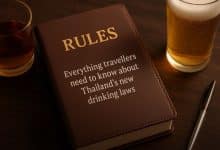TV sequel rewrites the law: Phrom Likhit sparks interest in Thailand’s ancient laws

Thai television phenomenon Phrom Likhit, a sequel to the hit series Buppesannivas, has reignited interest in Thailand’s ancient laws. The series introduces a new character, Mae Klin, who frequently quarrels with the show’s protagonist, Mae Pudtan.
These verbal exchanges have led to a renewed curiosity about how Thailand’s archaic laws would handle such disputes, including the infliction of verbal and physical harm.
Phrom Likhit continues to engage audiences with its heated and dramatic storylines. Particularly notable is the introduction of Mae Klin, a character performed by actress Namtan-Pichukkana, who excels in her role as a villain. She frequently clashes with Mae Pudtan, a character brought to life by Bella-Ranee Campen. Their verbal sparring matches provide much of the series’ entertainment.
Despite numerous verbal confrontations between the two characters, no physical altercations have occurred. However, Thailand’s ancient laws offer clear guidance on how such situations should be handled.
The old Thai law, known as Prayaiyakarn Lakkan Wiwat Datee Kan, which covers disputes, verbal harm, and physical harm, explicitly outlines the penalties for these offences.
The law is detailed in the Three Seals Law or the Penal Code of the First Reign, the first codified law used from the early Rattanakosin period, which continued from the Ayutthaya period. It specifically addresses offences related to verbal harm, defamation, and physical harm.
Ancient Thai laws
For example, the law states that in a dispute within the royal premises, the penalties can range from flogging and imprisonment to nail removal. In cases of defamation, the law even covers the topic of infidelity, stating that if the accusation is true, the person being accused should be punished, while if the accusation is false, the accuser must compensate the victim.
The ancient law also provides for different penalties based on social status, with higher-ranking individuals entitled to higher compensation. It also covers situations where groups of people are involved in a dispute, outlining how compensation should be divided among the participants.
The ancient Thai laws, as depicted in Phrom Likhit, provide a fascinating glimpse into Thailand’s legal history. However, these laws were replaced by the more modern Penal Code of R.S. 127 in 1908, during the reign of King Rama V.
Nonetheless, the Three Seals Law or Penal Code of the First Reign, which was used for nearly 500 years, remains a significant part of Thailand’s cultural heritage reported KhaoSod.
Follow more of The Thaiger’s latest stories on our new Facebook page HERE.
Latest Thailand News
Follow The Thaiger on Google News:


























